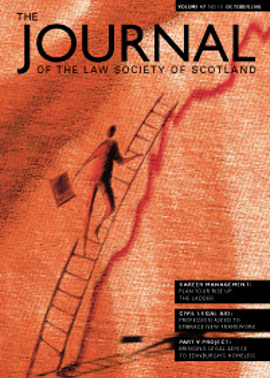Book reviews
Adopting the format of the first edition, the authors have supplemented a fully annotated version of the 1982 Act, by the inclusion of a full explanatory introduction and the main supporting statutory instruments all in one place. The result is a single volume which deals in some depth with background information on the development of civic government licensing, the changing pattern of licensing authorities, culminating in the creation of unitary councils as civic government licensing authorities, as the result of the reorganisation following on from the Local Government etc. (Scotland) Act 1994. The basic scheme of the legislation involving as it does the division of licences into mandatory or optional categories is covered, as is the scope for further designation of additional activities by ministerial order of the Scottish Executive. The licensing process including grounds for appeal to the sheriff and judicial review is described as are the enforcement provisions available in terms of the legislation.
Inevitably the Human Rights Act 1998 has significant implications in this area, and the developing case law, particularly as it relates to the potential for challenge in terms of Article 6, is well documented. On a more prosaic note, statistical information on the numbers of licences issued by authorities covering the range of activities licensed is set out. This material is useful, if somewhat mature, drawing on data from the late nineteen nineties. Similar information on the range of fees chargeable across the country will be less stable, given the financial constraints under which licensing authorities operate.
Since their designation as a mandatory activity in June 2000 licensing of houses in multiple occupation has generated some teething problems and the second edition provides a commentary on the introduction of a graduated scheme of compulsory licensing for dwellings of this sort.
Overall this text provides a thoroughly useful guide for those with an interest in civic government licensing law, whether regulator, applicant or objector. If, as seems likely, the current review initiated by the Scottish Executive in relation to this area of the law is modest in its ambition the purchase of this edition may well prove to be a worthwhile and relatively long term investment.
David Sillars
In this issue
- Scottish Solicitors’ Discipline Tribunal
- Opinion
- Dispelling myths of civil legal aid reform
- How healthy is your career?
- Hidden traps, new liabilities
- A lack of diligence
- Discerning changes in sentencing trends
- Initiatives to improve customer service
- Bringing legal advice to the socially excluded
- Keeping children safe on the internet
- Website reviews
- Technology to the rescue?
- In practice
- Plain speaking
- Book reviews






